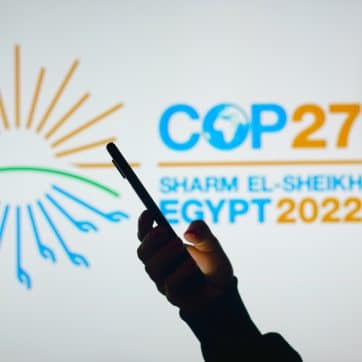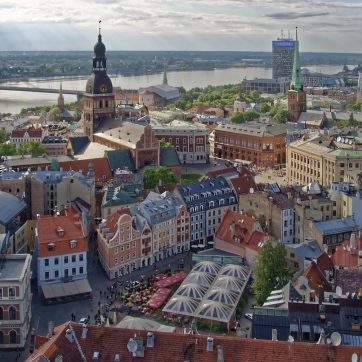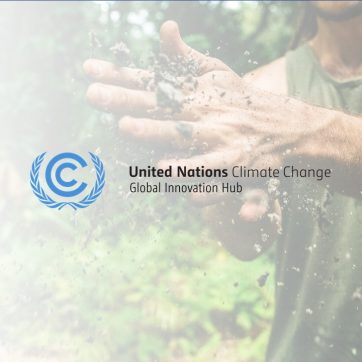
Systems innovation for a just and resilient future
Climate change is a systemic and complex global issue that causes extreme uncertainty about the future. At EIT Climate-KIC, we are working to achieve a climate resilient, inclusive and beautiful world for everyone. This vision requires tremendous social transformation.
Addressing the climate crisis is indeed about changing the way we live and the ways our economic systems work, it’s about shifting our finance to integrate a long-term view, and about building hope – and excitement – for a desirable future that is compatible with our planetary boundaries.
AT EIT Climate-KIC, we are using systems innovation to catalyse change in cities, regions, industries and value chains. We see the systemic transformation we aim for as a collaborative endeavour, and the principles of co-creation and interdisciplinary action are essential to its success, especially at a time of social fragmentation and division.
In practice, it means we are connecting stakeholders to share ideas and networks, to act together. We are already working with our community of over 450 partners, a growing number of funders and the European Commission.
We will be at COP27 to share our expertise in offering systems innovation to challenge owners who have the most climate ambition, as well as to listen and learn from other organisations’ experiences, in particular, the ones fighting climate change in the Global South and on the African continent.
Join us at COP27 and discover below highlights of our pioneering work in putting systems innovation into practice.

Strengthening innovation ecosystems and communities in the Global South
Countries that contribute the least to the climate crisis are the ones most impacted by its effects. At the same time, innovators working on climate adaptation solutions in developing countries face many challenges – in particular a lack of access to finance – that prevent them from scaling their solutions and limit the development of climate start-ups and entrepreneurial skills.
EIT Climate-KIC is working with local delivery partners such as GrowthAfrica and Carbon Trust to strengthen existing innovation ecosystems in the Global South. We support African climate innovators working on technologies explicitly focused on developing and growing climate-positive business models with training, mentorship, and access to funding via our incubation and acceleration programmes. For instance, EIT Climate-KIC’s Africa ClimAccelerator offered 15 start-ups customised workshops, training, and grant funding of €12,000 financed by Deutsche Gesellschaft für Internationale Zusammenarbeit (GIZ) and the German Federal Ministry for Economic Cooperation and Development (BMZ).
EIT Climate-KIC is also establishing the first ‘adaptation innovation cluster’ in Tanzania to maximise the coordination between stakeholders for a local climate innovation ecosystem, and our new ClimAccelerator focuses on adaptation and resilience to support the African region where risk mitigation and preventative climate solutions play an essential role for the communities affected the most by these extreme weather conditions.
At the same time, EIT Climate-KIC is working on a Gender Mainstreaming for Entrepreneurship programme that provides gender-equal climate entrepreneurial training for women innovators. Thanks to the support of Irish Aid, five EIT Climate-KIC partners in the Global South will carry out a holistic transformation of their entrepreneurship programmes that will aim to better serve and support female leaders.
Selected snapshot stories to dive deeper into this topic:
climate tech solutions in Africa gender mainstreaming gender-smart handbook WeClim Equally gender-smart video

Supporting the most ambitious municipalities to reach their climate targets
Home to 75 per cent of Europeans and responsible for more than 70 per cent of global CO2 emissions, cities can lead the European Union’s pathway to a zero-carbon world. Led by EIT Climate-KIC, the NetZeroCities programme launched in October 2021 puts the European Green Deal into practice. It will support 100 European cities selected by the European Commission in April 2022 in achieving climate neutrality by 2030.
NetZeroCities brings together a consortium of 33 partners including city networks, academia, think tanks and businesses. In April 2022, the European Commission selected the 100 European cities that will join its Mission on Climate-Neutral and Smart Cities and receive support from the NetZeroCities programme. Amsterdam, Copenhagen, Kraków, Leuven, Madrid, Malmö, Milan and Sarajevo, who are already working with EIT Climate-KIC through its Healthy, Clean Cities Deep Demonstration programme joined the cohort of cities.
The Cities Mission will receive €360 million of Horizon Europe funding to start their journey towards climate neutrality. The research and innovation actions will address clean mobility, energy efficiency and green urban planning, and offer the possibility to share best practices to build joint initiatives and extend collaborations with other EU programmes.
On 5 September, NetZeroCities launched a two-year programme (€32 million in grants and hands-on support) that will provide cities with support to implement a systemic approach to planning their approaches to rapid decarbonisation. The programme will identify cities or districts to implement large-scale piloting activities to deploy and scale systemic solutions that combine social, cultural, technological, nature-based, regulatory, research and financial innovations, as well as new business and governance models to underpin the transition to the net-zero.
More information here:
NetZeroCities Website €32 million FOR carbon neutrality in cities
Net Zero Cities is not EIT Climate-KIC’s only effort to help municipalities to tackle the climate emergency. We are also working on a Healthy, Clean Cities Deep Demonstration programme to support a cohort of 15 city governments across Europe to reach their ambitious climate goals. Through this programme, we develop portfolios of interconnected innovations capable of delivering widespread transformation across all urban systems – mobility, waste, energy, health and the built environment.
In 2022, the City Council of Milan approved the Air and Climate Plan (PAC), an action plan that involved citizens, associations, businesses and other city actors in transforming Milan into a cycle-pedestrian friendly-city. The foundation for the development of the PAC was laid through Milan’s participation in the Deep Demonstrations of Healthy, Clean Cities.
At the same time, the Belgian city of Leuven co-created a new mobility plan for its Kessel-Lo borough, putting citizens at the heart of the transformation. The plan gives priority to pedestrians, reduces car traffic and encourages the development of public transport and cycle routes. The shape of the plan stems from Leuven’s participation in the Deep Demonstration programme.

The UN Climate Change Global Innovation Hub
For our CEO, Kirsten Dunlop, the disastrous global impacts of the climate crisis call for far more than substitutive actions that seek to maintain our current ways of life. It calls for urgent, courageous, transformative change. She says: “Innovation is key to making deliberate choices to transform ourselves and to generate hope and possibility while doing so, but it must be innovation that encompasses and achieves whole systems transformations, relevant to local places and people.”
EIT Climate-KIC’s experience in helping cities, regions and countries achieve ambitious climate targets demonstrates the importance of working to shift the current agenda from an incremental and problem-oriented approach to a transformative, need-based and solution-oriented one.
This vision is at the heart of the UN Climate Change Global Innovation Hub, an initiative created by the UNFCCC with the support of EIT Climate-KIC, aiming to promote transformative innovations for a low-emission and climate-resilient future. Launched during COP26 in Glasgow, the Hub provides a space for global cross-disciplinary communities to share ideas and design climate solutions in a spirit of radical collaboration. Its goal is to identify, assess, promote and work on 1.5° C-compatible solutions and support initiatives to accelerate their uptake and scaled-up deployment.
“The UN Climate Change Global Innovation Hub expands the innovation space to cover the most transformative climate solutions that can disrupt markets and entire supply chains,” says Massamba Thioye, Manager Mitigation and Project Executive of the UN Climate Change Global Innovation Hub.
As one of the founding core partners, EIT Climate-KIC will contribute to the content of the Global Innovation Hub during COP27. This includes the Cities Day, on 8 November, as well as sessions on the role of culture and creative industries in solving climate challenges, and on climate challenges and solutions in the Global South.
EIT Climate-KIC and the UNFCCC are also working together on Resilience Frontiers, an initiative launched in 2019 that visualises desirable futures for climate resilience and dives deep into the potential offered by emerging technologies and social trends.
Drawing the conclusion that our current mode of development is eroding the health of nature, and is destabilising the foundation of our quality of life, health, food security, livelihoods and economic prospects, Resilience Frontiers imagines a world where we harness the power of frontier technologies to enrich, rather than deplete, our environment and overall wellbeing. T
Dive deeper into this topic:

Building for the future
While cities are growing and need mitigation and adaptation solutions to the climate crisis, the increasing rural depopulation and economic activities that mine soils and landscapes are causing land to become sources of emissions, rather than sinks. A lack of land management also results in an increase of wildfires that create spikes of emissions, while opportunities for carbon sequestration are missed.
Today, our vision for land use is at a turning point. At EIT Climate-KIC, we are working with regional and national governments, European and international organisations, as well as a variety of industry leaders to turn landscapes from carbon sources to sinks, tackling a lack of investment, forging new social contracts with soil and forests and lining-up value-chain incentives.
With the city of Glasgow, we are working on implementing a Climate Smart Forest Economy Programme (CSFEP) with an overarching goal to sustainably and responsibly unlock the full climate potential of forests and forest products. This project is a collaborative initiative bringing together EIT Climate-KIC, the World Economic Forum and the World Resources Institute, with seed funding from the Good Energies Foundation. It also counts on an independent scientific council from The Nature Conservancy, and support from Dalberg Catalyst.
Dive deeper into this topic:

We need funding that matches our ambition
EIT Climate-KIC uses a portfolio approach to the development and deployment of innovation to achieve systemic change. We build portfolios of deliberately chosen innovations that work across technology, policy, finance, citizen engagement and other relevant levers of change. These portfolios test diverse ideas and approaches simultaneously in order to generate options and pathways for the transformation of whole systems and value chains.
We invite new funders to help shape and scale these portfolios for large-scale climate impacts.
Discover how to work with us! Contact us at fundraising@climate-kic.org

